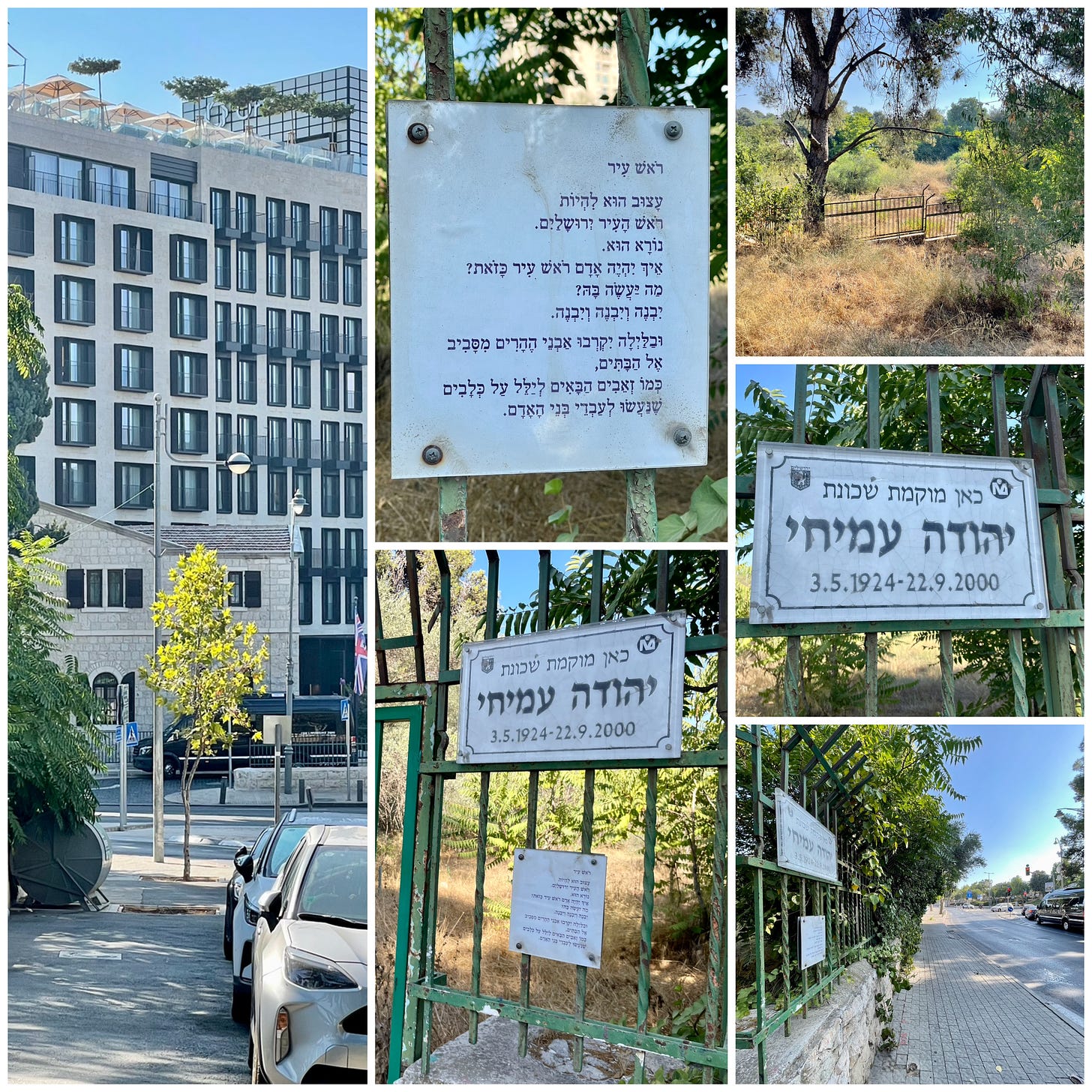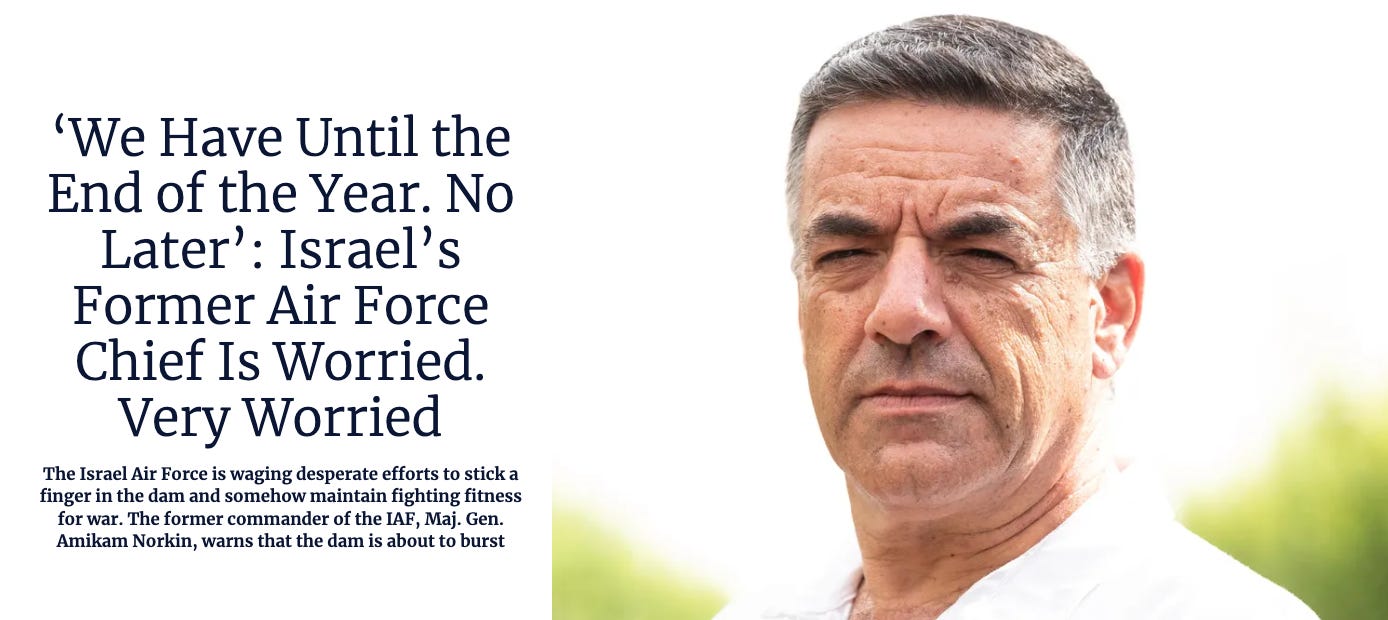Yehuda Amichai — "From the place that we are right, flowers will never grow in the spring"
Walking by what would have been the "Yehuda Amichai Neighborhood," which never came to be, a reminder of a much-missed prophetic voice
We live only a fifteen minute walk from the Orient Hotel (photo on the left below), which is situated on the corner of two very busy streets, Emek Refa’im Street and Bethlehem Road. By virtue of the vagaries of where we shop, take walks and walk to restaurants and the like, that’s a corner we drive by all the time, but hardly ever stroll by.
Last weekend, though, despite how close it is to our home, we actually stayed at the Orient for a few days as part of a long (and wondrous) wedding celebration. And since we were at the Orient over Shabbat, we ended up walking around the neighborhood, in all directions, numerous times.
And as we did, I came across two signs just across the street that I’d used to notice but had long since forgotten about.

The sign with the large letters (bottom middle and right middle) reads:
Here will be built the Yehuda Amichai neighborhood May 3 1924 — September 22, 2000
Yehuda Amichai was born born Ludwig Pfeuffer, but like many of that era, he Hebraicized his name; Amichai means “my people lives”—think am yisrael chai. With time, he became one of Israel’s best known and most beloved poets. In Zionism’s string of “national poets,” it’s fairly safe to say that the succession was Hayim Nachman Bialik (who died in 1934), then Natan Alterman, some of whose poems we’ve written about here in the past (who lived from 1910-1970), and then Yehuda Amichai (1924-2000).
While Israel has many very talented poets even today, it’s not clear that Amichai had a successor as “the nation’s voice.”
Of the three great Zionist/Israeli poets, Amichai’s poems are by far the most accessible, and often, the shortest, which—in addition to his deep soul and abundant talent—contributed to his ongoing popularity.
The vacant, overgrown lot (top right above) was intended to be a neighborhood in his memory, but it never happened. There was going to be a Four Seasons Hotel and luxury residences—until all the municipal infighting, fueled by objections from neighbors and architects and others, led Four Seasons to pull out. The lot is now a wasteland, smack in the middle of a very expensive neighborhood.
It’s thus not inappropriate at all (though I don’t know that the irony was intended when the sign was put up) that the sign with the longer text is actually a poem of Amichai’s, titled “Mayor.”
The poem begins (you can read the read of the poem here):1
It's sad To be Mayor of Jerusalem. It is terrible. How can any man be the mayor of a city like that?
It is, perhaps, sad to be Mayor of Jerusalem. I don’t know. But what is certain is that it’s also sad to read a poem like that.
Walking by the signs announcing the Amichai neighborhood that never came to be, I realized that we’ve been hearing more of Amichai here in Israeli lately, because of the combination of hope and deep sadness that he captured, a combination of emotions that has this entire, exhausted nation in its grip.
One of the poems that is commonly referred to these days, in Op Eds and columns and on the radio and elsewhere, is called “The Place Where We Are Right.”2
On the surface, the poem is simple, and it’s obvious why so many people would be quoting it and referring to it these days. Many of us are certain that we are right; and from that place, insists Amichai, flowers will never grow in the spring, hope will not seep through the cracks.
What we need is not certainty, said Amicha, but doubt, and love. They are what dig up the earth, like a plow.
But what are we to make of the last three lines of the poem? It’s easy to overlook them, but it’s clear that something shifts there.
What is whispering? Who is whispering? What, if anything, is being whispered? And which House was destroyed? The Temple? The Second Temple?
Or this “house”?
Was Amichai warning us to make space for doubt and love? Or, perhaps, was he saying in his last three lines that what we’ve created here is a space that never had either, and that it is therefore too late?
The house is going to fall, and all that will remain will be whispers?

Instead of arguing about pilots who won’t fly and doctors desperate to flee the country and record numbers of Israelis exploring “relocation” (which used to be called yeridah, the opposite of aliyah, but that term became very not-PC), I think that this week, or over Rosh Hashanah, or whenever, we’d be better off just printing out Amichai’s poem and discussing with those we love, those around our table—what it is he might have been trying to say?
One closing thought. Many, many Israeli poems by Bialik, Tchernichovsky (another giant), Alterman and others have been put to music. Many have become Israeli classics, so much so that people know the song but have no idea that the song originated as a poem of an Israeli great. So it goes.
This poem, too, was put to music, but the song never really took off. Was it the melody that didn’t speak to people? Or something about the words that simply defied melody? Or the heartbreak that no one wanted to sing?
Here’s a performance of the song that was written—you can decide for yourself.
It’s going to be a long, difficult September, with the Knesset coming back into session, a head on collision between the Supreme Court and the government quite possible, and, in addition, the very real chance that soon after that the air force will cross some line that will render it non-functioning.
Maybe this is precisely the moment to remind ourselves, as Amichai said,
From the place where we are right flowers will never grow in the spring. The place where we are right is hard and trampled like a yard. ... But doubts and loves dig up the world like a mole, a plow.
My friends and I all know that we’re right when it comes to what’s happening now in Israel. Of course we do—everyone does. And we’re not about to give up thinking what we deeply believe.
And yet, I wonder, might there be some moments when the most important thing for us to do, precisely when we’re certain that we’re right, is to search desperately for reasons to doubt ourselves.
Maybe, just maybe, come spring, flowers might still blossom, and even more importantly, there might still be reason to hope?
With the High Holidays just weeks away, we wanted to share the schedule for Israel from the Inside during that period.
During the week of Rosh Hashanah and the Fast of Gedaliah (on Monday, there will be no written column on Monday, September 18th, but we will post our regular Wednesday podcast on September 20.
During the week of Yom Kippur, there will be no written column on Monday, September 25th (which is the day of Yom Kippur), but we will post our regular Wednesday podcast on September 27.
During the week of the holiday of Sukkot (Monday, October 2 and Wednesday, October 4), we are planning not to post.
The regular schedule of written columns on Mondays and podcasts on Wednesdays will resume the following week.
To all who are observing and celebrating, our wishes for a meaningful and joyous High Holiday season.
Impossible Takes Longer is now available on Amazon and Barnes & Noble and at other booksellers.
Our Twitter feed is here; feel free to join there, too.
Our Threads feed is danielgordis. We’ll start to use it more shortly.
To state the obvious, which seems increasingly nececssary these days, I’m not endorsing the website or its views. I’m simply linking to a translation of the poem.
Translation of the poem is taken from here: https://daysofawe.net/shebotzodkim.htm









Nice article!
Written with love!
Yet I have about some of the material…
PLEASE verify spelling of Hebrew poem before print. Why do misspelled words shed additional doubt on the delivered messages? I am not sure why!
Thank you for thought provoking read. Shana Tova to all.